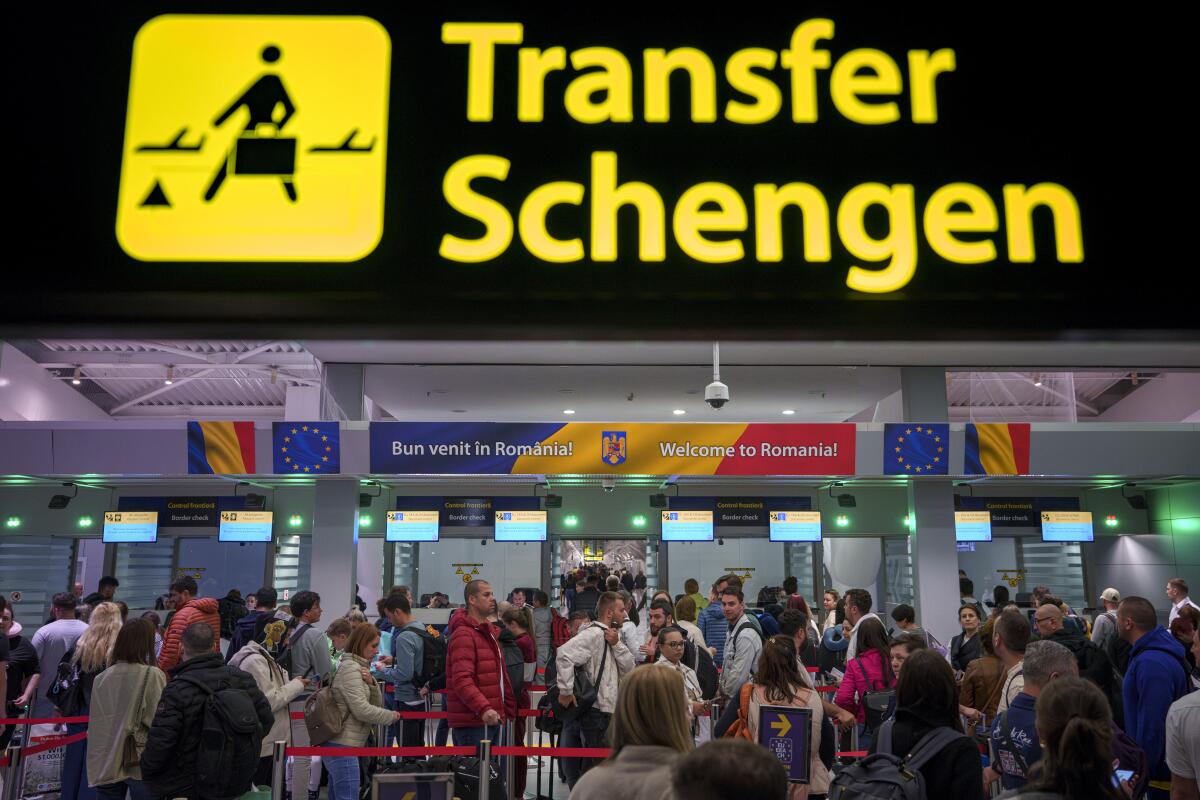Romania and Bulgaria join Europe’s Schengen travel zone but keep land border checks

- Share via
SOFIA, Bulgaria — Romania and Bulgaria partially joined Europe’s ID-check-free travel zone on Sunday, marking a new step in the two countries’ integration with the European Union.
After years of negotiations to join the Schengen Area, there is now free access for travelers arriving by air or sea from both countries. However, land border checks will remain in place due to opposition primarily from Austria, which has long blocked their bid over illegal migration concerns.
EU Commission President Ursula von der Leyen hailed the change as a “huge success for both countries” and a “historic moment” for what is the world’s largest free travel zone.
Question: Twice a year for more than 10 years, I have been flying to Zurich, Switzerland, from LAX.
The Schengen Area was established in 1985. Before Bulgaria and Romania’s admission, Schengen consisted of 23 of the 27 EU member countries, along with Switzerland, Norway, Iceland and Liechtenstein. Around 3.5 million people cross an internal border each day.
Austria vetoed Romania and Bulgaria’s admission into the Schengen zone at the end of 2022 but allowed Croatia full accession. Bulgaria and Romania joined the EU in 2007 and Croatia in 2013.
Siegfried Muresan, a Romanian member of the European Parliament, told the Associated Press that it is “an important first step” that will benefit millions of travelers annually.
“Bulgaria and Romania have been fulfilling all criteria for joining the Schengen Area for years — we are entitled to join with the terrestrial border as well,” he said, adding that it “will offer additional arguments to the last EU member state that has been vetoing the full accession.”
As of Jan. 1, Croatia will use the EU’s common currency and join its borderless travel area, a milestone since gaining independence 31 years ago.
Romanian Prime Minister Marcel Ciolacu called it a “well-deserved achievement” for Romania that he said will benefit citizens who can travel more easily and will bolster the economy.
“We have a clear and firmly assumed government plan for full accession to the Schengen Area by the end of the year,” he said.
The EU’s executive branch, the European Commission, has said for more than a decade that Romania and Bulgaria both meet the technical criteria for full accession, which requires unanimous support from their partners. Both countries have agreed to implement random security screening at airports and maritime borders to combat illegal migration and cross-border crime.
“Bulgaria’s full accession to Schengen will happen by the end of 2024,” Kalin Stoyanov, Bulgaria’s interior minister, told reporters on Sunday. “We showed and continue to show to illegal migrants that they should not take the road to Europe through Bulgaria.”
Northern European Union countries are calling for a broad ban on tourist visas for Russian citizens, but Germany, among other EU members, demurs.
The lifting of border control is expected to facilitate operations at Bulgaria’s four international airports, which in 2023 saw nearly 11 million passengers, according to official data.
The airport in the capital, Sofia, serves as the biggest hub for Schengen flights, which constitute 70% of all flights, airport representatives said.
While the eased regulations are expected to positively impact the tourism sector, members of the European Parliament have voiced concerns about long queues at the EU’s land borders and the impact it can have on trade in the bloc’s single market, as well as the health and safety of drivers.
Truck drivers are frequently stuck in kilometers-long queues at the borders of both Romania and Bulgaria. The Union of International Carriers in Bulgaria estimates delays cost the sector tens of millions of euros each year.
Stephen McGrath and Veselin Toshkov write for the Associated Press. McGrath reported from Sighisoara, Romania.
More to Read
Sign up for Essential California
The most important California stories and recommendations in your inbox every morning.
You may occasionally receive promotional content from the Los Angeles Times.












